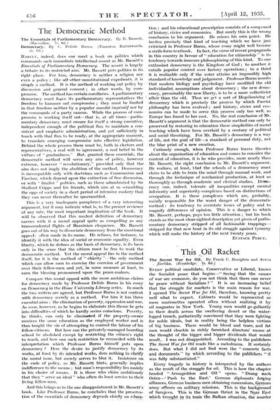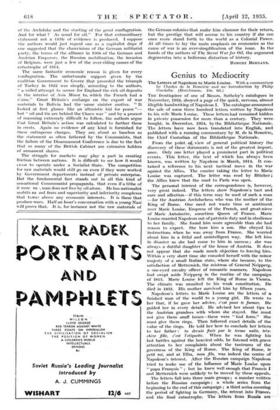This Oil Racket
EVERY political candidate, Conservative or Liberal, knows the Socialist poser that begins—" Seeing that the causes of war are economic, do you not think that there can never be peace without Socialism ? " It is an increasing belief that the struggle for markets is the main reason for war. I opened The Secret War for Oil, therefore, knowing pretty well what to expect. Cabinets would be represented as mere marionettes operated often without realizing it by oil magnates in New York.. Young men would go gallantly to their death across the `sweltering desert or the water- logged trench, pathetically convinced that they were fighting for noble ideals, but in reality being the helpless victims of big business. There would be blood and tears, and fat men would chuckle in richly furnished directors' rooms- at the thought of the bigger and bigger dividends that would result., I was not disappointed. According to the publishers The Secret War for Oil reads like a melodrama. It certainly does. But what I did not find were the " concrete facts and documents " by which according to the publishers " it was fully substantiated."
Every tragedy in history is interpreted by the authors as the result of the struggle for oil. This is how the chapter headed " Armageddon and Oil " opens. " Drang mach Osten—` Push to the East:' German diplomats forging alliances, German business men obtaining concessions, German army officers on military missions. This is the background of Sarajevo. This is the German thritst in the Near East which brought- in its train the Balkan situation, the murder
of the Archduke and the starting of the great conflagration. And for what ? As usual for oil." For that extraordinary statement not a tittle of evidence is produced. I suppose the authors would just regard one as a capitalist dupe if one suggested that the chauvinism of the German militarist party, the terms of the alliance in 1908 of the German and Austrian Emperors, the Russian mobilization, the invasion of Belgium, were just a few of the over-riding causes of the catastrophe of 1914.
The same fantastic economic reason is given for every conflagration. The unfortunate support given by the coalition Government to Greece that preceded the triumph of Turkey in 1922 was simply, according to the authors, a veiled attempt to secure for England the rich oil deposits in the interior of Asia Minor to. which the French had a &aim." Great Britain's embargo on the export of war materials to Bolivia had the -same sinister motive. It looked at first glance like an altruistic bid for peace "- but oil and tin are behind the Chaco war " and by a process of reasoning extremely difficult to follow, the authors argue that Great Britain's action was calculated to further these in erests. Again no evidence Of any' kind is. furnished. for these outrageous charges. They are, about as baseless as the statement so often fathered by the Communists, that the failure of the Disarmament Conference is due to the fact that so many of the British. Cabinet are extensive holders _ of armament shares.
The struggle for markets may play a part in creating friction between nations. It is difficult to see how it would c ease to operate under a Socialist State. The competition for raw materials would still go on even if they were worked by Government departments instead of private enterprise. But the fundamental fact stands out in all this kind of sensational Commmunist propaganda, that even if a tithe of it were ru s, man does not live by oil alone. He has nationalist ambitic ns And fears and- superiority and inferiority complexes that tower above any economic interests. It is these that produce wars. Half an hour's conversation with a young Nazi will prove that. It is, for instance not the raw material's of the Gerthan colonies that make him clamour for their return, but- the prestige that will accrue to his country if she can once more stand forth to the world as a Colonial Power. At all times to lay the main emphasis on economics as the cause of war is an over-Simplification of the issue. In the hands of the authors of The Secret War for Oil, the argument degenerates into a ludicrous distortion of history.
ROBERT BERNAYS.



















































 Previous page
Previous page